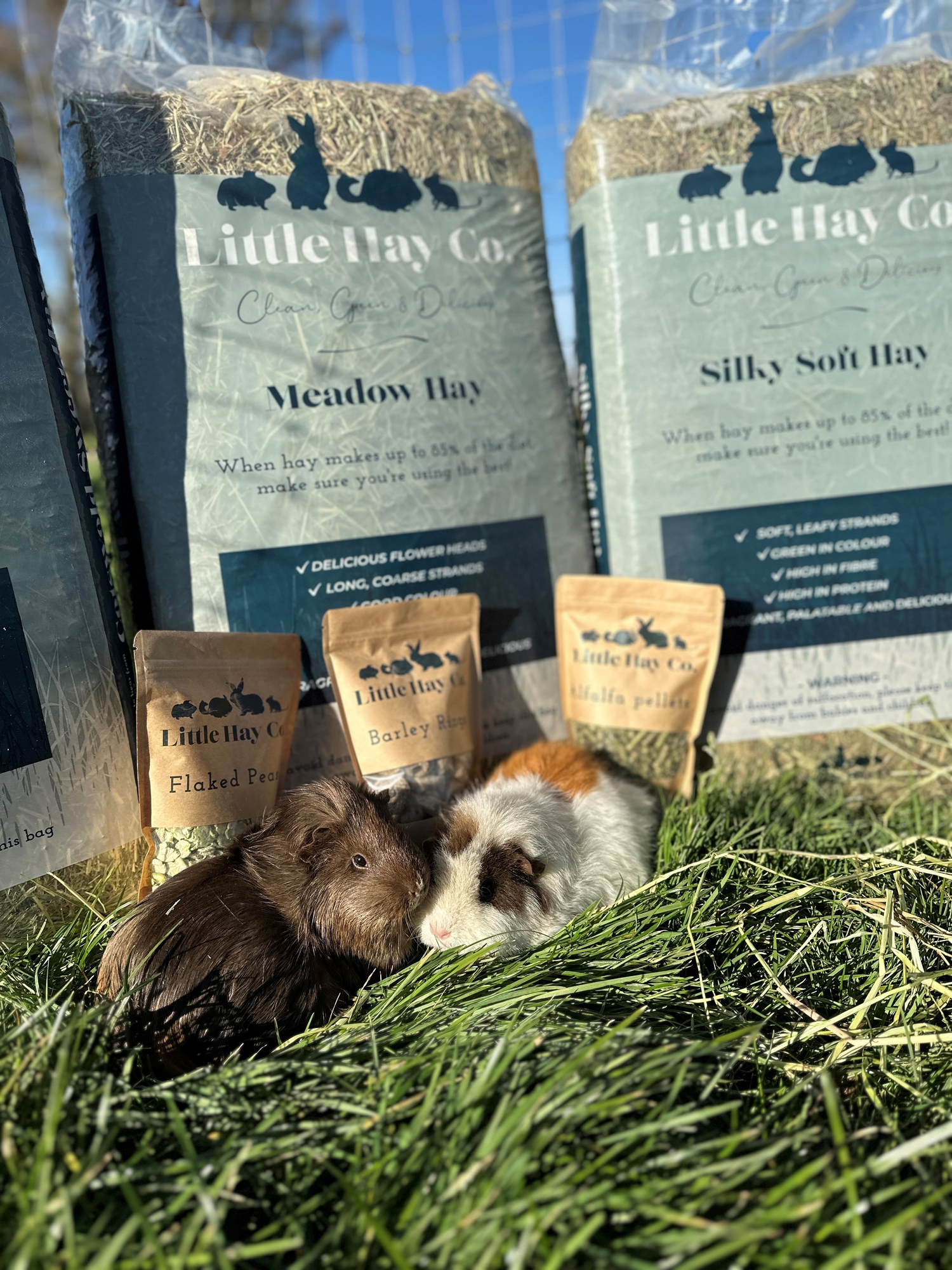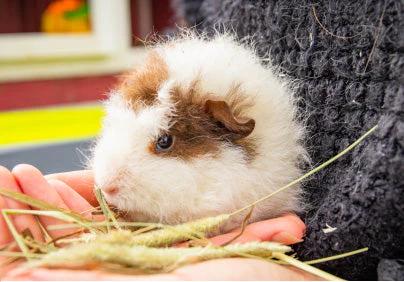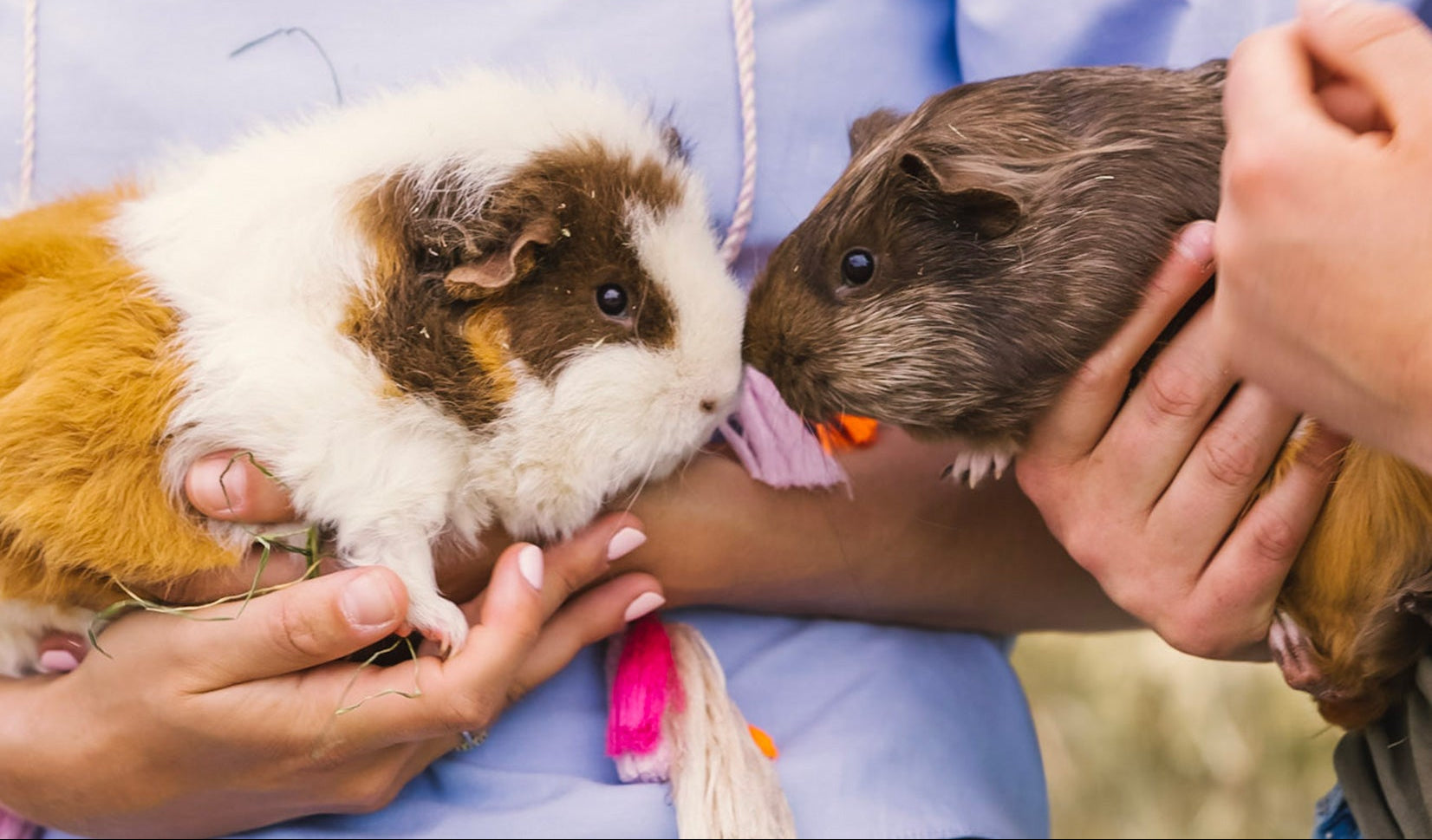Baby rabbits and diet
You can hear the patter of tiny paws - a baby rabbit has come into your life. It’s an exciting time, but what do you feed a baby rabbit? What’s the best diet for a baby rabbit? How much should you feed your baby rabbit? Let's look at these and a host of other baby rabbit related questions to help you give them the best start in life.
A note: What are baby rabbits called?
It’s a lesser-known fact that baby rabbits are not officially called bunnies. They are called kittens. Bit confusing, we know. The female rabbit known as the doe gives birth (kindling), and the baby rabbits are called kittens or kits.
Baby rabbit’s diet from birth to adulthood
When a baby rabbit is born, it will first feed on its mother milk. This is why you should not get your rabbit from its Mother before a minimum of 8-weeks has passed. This time is crucial and helps start your baby on a healthy path.
From around 2-3 weeks old, baby bunnies start to nibble at the hay around the nest and at around 6 weeks baby rabbits start to rely more heavily on hay. Baby rabbits need to eat Alfalfa hay as it is high in calcium by 7 weeks they can have unlimited access to Alfalfa hay and begin eating a small amount of alfalfa pellets.
Weaning occurs at around 6-8 weeks old as their digestive system adapts from liquids to solids.
As with all young animals, baby bunnies will be very sensitive to change. Their stomachs like consistency, so if you are adopting a young bunny it is important to keep their feed the same, if you want to change the hay used then you need to do this slowly and gradually,
Once your rabbit is an adult, it will eat mainly hay (like our Timothy Hay or Meadow Hay) with additional good treats like green leaves and vegetables for variety and extra goodness. We have a selection of forage, dried fruit and veg and treats to offer your bun to help with bonding as well as a balanced diet.
Baby rabbits and moving homes
We all know how moving home is one of the most stressful things you can do. Your baby rabbit will feel the same. It is a good idea to know in advance exactly what food your baby rabbit has been eating so you can get a supply ready for them in their new home. This will help ease the transition and make your bunny feel more at home. You can slowly change their food if it is not of the best quality, but best to do this slowly rather than changing the food they are accustomed to overnight.
If you do not know what your baby bunny has been eating, then the safest bet is to offer a quality hay like our Timothy Hay and water as they settle in.
Wild and abandoned baby rabbits
It is not always easy to know if a nest of baby rabbits has been abandoned. The mother will stay away from the nest during the day to avoid alerting predators to its position, only returning under the cover of darkness.
Wild rabbits can survive on their own after 3-weeks, so even though they look small, they may be completely healthy and not orphaned. It is best to leave them alone.
If you hang around a nest and move things around, you are more likely to make the Mother abandon the nest, as she feels it is no longer safe. It's always best to keep your distance.
Convinced the rabbit's nest is abandoned? Then you can do a simple test. Leave a piece of natural string or fibre over the nest, so that if the Mother returns in the night (which she definitely would) she will disturb it. When you check again in the morning, if it is where you left it, then chances are the nest has been abandoned. The best thing you can do is phone a specialist rescue centre.
Young rabbits’ diet

A young rabbit will need lots of good food to help it grow strong and healthy. In the wild, they will eat a variety of grasses and succulents. With you at home, most young rabbits are fed with a mix of hay and pellets.
Alfalfa Hay is ideal for a growing bunny as it is rich in protein and calcium and tastes great. They will eat this happily and voraciously. As they get older, too much protein and calcium in the Alfalfa Hay will cause problems with their bladder and make them overweight.
A good approach as they get older is to combine Alfalfa Hay with another hay source like Timothy Hay, Rye Grass Hay or Meadow Hay and then gradually reduce the amount of Alfalfa Hay in the diet until you stop it completely.
Baby rabbit food list
A baby rabbit (up to 6-8 months old) can eat a variety of food.
Alfalfa hay should be available to your growing bunny every day. Give a chunk of hay roughly the same size as your bunny. You can also give your bunny an egg cup full of pellets once a day whilst they are growing. These are usually alfalfa-based pellets (not containing extra seeds or anything else). Again, these alfalfa pellets should be slowly weaned from your rabbit once they are around 6-months old and no longer need the extra calcium and protein.
As Alfalfa hay and pellets are quite tasty, moving them to Timothy Hay or Rye Grass Hay can take a bit of perseverance, but it is the best thing for your bunny and should take a few months, there's no need to rush it.
The other food source to slowly introduce is green leaves. A small amount at first (one or two leaves) and only slowly building up or adding new green leaves as you progress.
Green leaves to try: Basil, broccoli leaves, butter lettuce, cabbage, dandelion greens, dill, kale, mint, oregano, parsley, spinach, watercress, rosemary, carrot tops and others. With such a range, you can find out your rabbit's favoured green leaf with a bit of experimentation and keep them interested with variety.
Hay for baby rabbits
Baby rabbits will start to nibble on hay after a few weeks and then should be moved to a diet full of hay after they are weaned from their mother’s milk. The type of hay they eat is important.
Alfalfa hay is ideal hay for baby bunnies as it is richer in calcium (which helps their bones grow strong) and protein which gives them the energy they need to grow up healthily. Alfalfa hay also tastes good to a baby bunny. This is also its downfall. As your bunny gets bigger and enters adulthood, everything that makes alfalfa hay good for them as a baby is bad for them as an adult. Too much calcium will cause bladder issues and too much protein will make them overweight. This creates additional health issues for rabbits.
Timothy hay and Meadow hay or another adult type of hay have less calcium and protein, so is much healthier for your bunny. Learn all about all the different hay types for your bunny. The trick is to move your young rabbit over to Timothy Hay without them missing Alfalfa hay too much. To do this takes time but is essential. Start the process slowly by adding more Timothy Hay and taking out some Alfalfa, over a few months complete the process until there is no alfalfa hay being given to your bunny at all.
Dry pellets for your baby rabbit
Should I feed unlimited pellets?
In short, no. A baby rabbit will love eating pellets and giving them an unending supply will create problems with their diet. A quality hay diet like the Timothy Hay created by The Little Hay Co. mixed with alfalfa hay whilst they are young is the best for your rabbit, with pellets added for extra nutrients. A baby rabbit will usually only have an egg cup full of pellets when young, with this only increasing a little as they get bigger. Moving a rabbit onto hay as soon as possible is more natural and will help with their teeth health. Hay naturally wears down their teeth to a manageable and healthy size.
Changing dry food/pellets
You should swap out your pellets daily, so they always have a fresh supply. You will probably find most young bunnies eat all the pellets they are offered anyway, but if any are leftover, swap them out with new fresh ones.
Fresh fruits and vegetables for baby rabbits
When can a baby rabbit have fresh foods?
Around 3-months is a good time to introduce fresh foods to your rabbit. Ideally, you should introduce fresh food to a rabbit one at a time. This will allow you the chance to see which ones they like most and if any affect their digestive system in negative ways.
Which fresh fruits and vegetables are suitable for a baby rabbit?
Leafy greens are an excellent fresh food to give a baby rabbit. Carrot tops, dandelion leaves, kale, spinach, spring greens, herbs like parsley or basil, watercress, broccoli greens and cilantro can be offered to baby rabbits in moderation.
Can baby rabbits eat grapes, apples, bananas?
Giving a baby rabbit fruit is a little trickier. Fresh fruit often contains too much sugar for a baby rabbit, so should only be offered as a treat once a week. These treats for rabbits include apple (without seeds), banana, strawberries, blackberries, raspberries, cranberries, cherries (no seeds), melon, grapes, orange and nectarine.
At what age can rabbits eat grass?
Baby rabbits can usually eat grass after about 8-weeks. They’ll probably pick at grass or hay whilst still feeding on their Mother's milk and will transition across to hay completely at around 8-weeks. Fresh grass is not always practical for a bunny owner, hay (which is dried grass) is usually the main diet of all rabbits.
Should I give meat to a baby rabbit?
No. Rabbits are herbivores and do not ever eat meat.
Can baby rabbits drink water?
Baby rabbits are getting milk from their mother, but at around 3-4 weeks old, they will start to drink small amounts of water too. As they grow and their diet changes, so will their water intake. Hay is dry, so a rabbit eating hay will want more water than a rabbit eating fresh leafy greens. But all animals need fresh water to survive, so it should be a plentiful resource to your bunny.
How often should I feed a baby bunny?
As you should have picked up your bunny after it has weaned from its mother and not before 8-weeks old, your bunny will already be eating hay and pellets and fresh greens. A ball about the same size as your bunny is the right amount of hay each day. The fresh food should be limited and slowly added over time.
If your baby rabbit is refusing to eat?
A rabbit’s digestive system needs to work constantly to avoid health problems, so any interruption in eating habits needs addressing quickly. If your rabbit is eating a small amount, they may be bored, so you can try to tempt them with leafy greens and remove the pellets. If they are still not interested in any food, you should get them checked by your nearest specialist.
Transitioning into adult rabbits
Rabbits grow fast to help them survive in the wild. The period a rabbit is a baby is short. After 3-weeks a wild rabbit will leave the nest, fend for itself and return at night. A baby rabbit should stay with its mother for 8-weeks to get all the protection her milk offers at this critical life stage.
The transition into adulthood is quick, after 6-8 months they will be eating a quality Timothy Hay, Rye Grass or Meadow Hay. Rye would be the easiest transition as it is tasty so you will be able to wean them off the Alfalfa without too much problem. we would recommend choosing two hays for daily feeding to help encourage good hay intake.
Shop Alfalfa Hay and Pellets.
Read More about Alfalfa hay here














